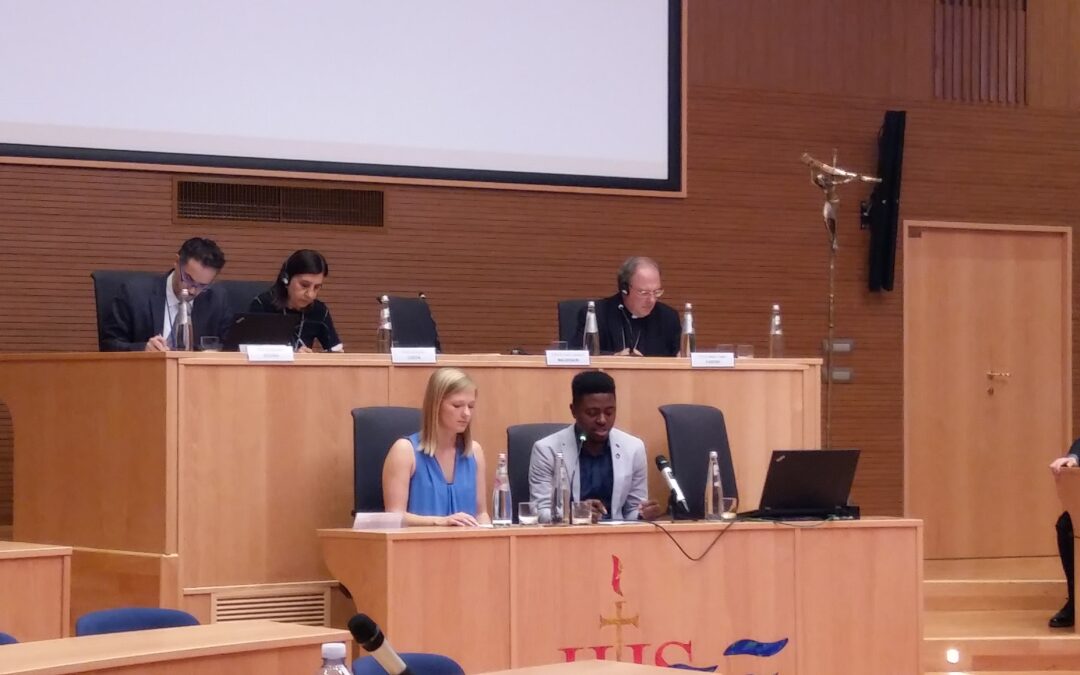
Sep 22, 2017 | Non categorizzato
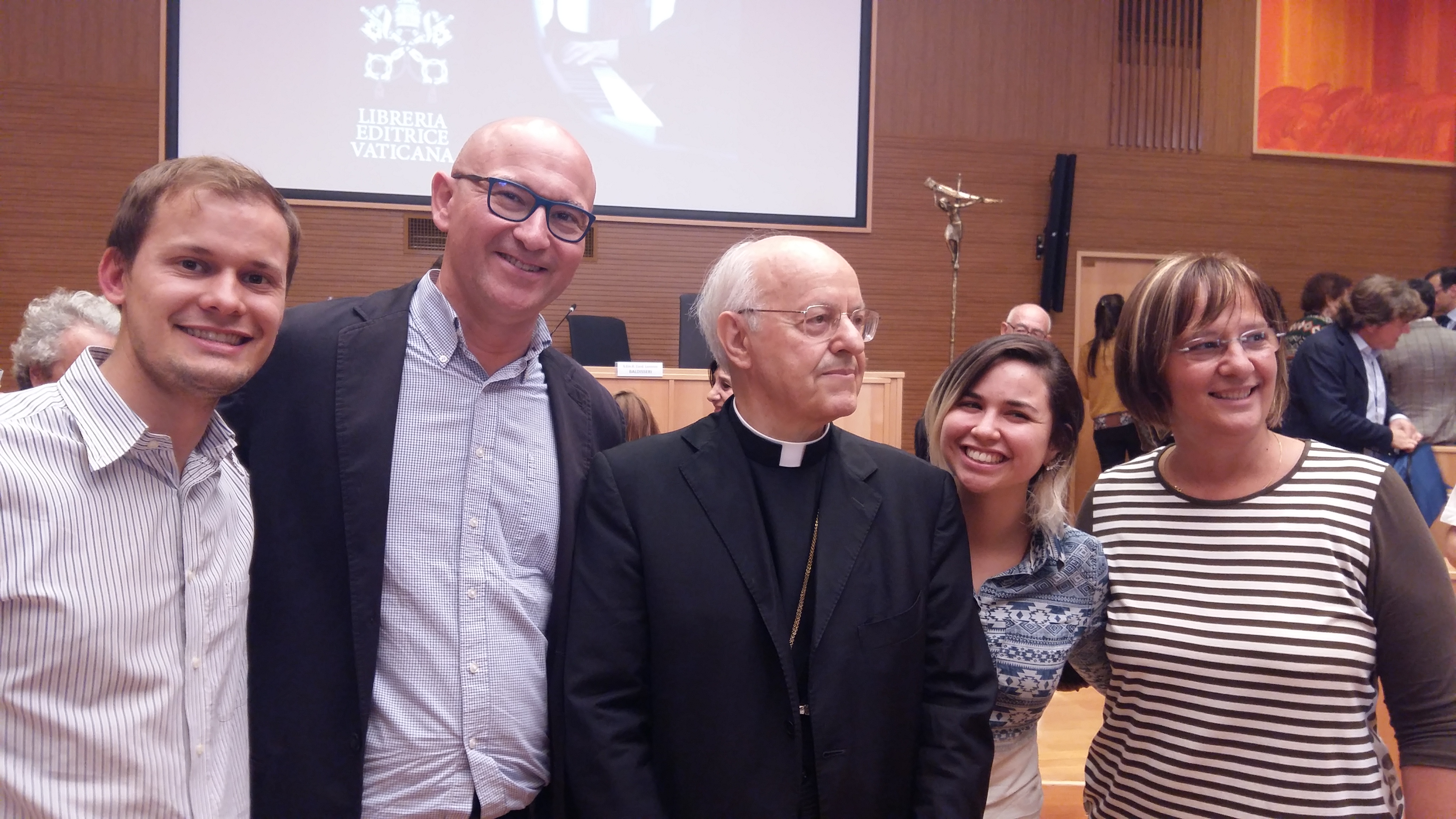 “An experience of the living Church, on a journey, in dialogue, and going forth,” are the words of Paola Pepe e Jonathan Michelon (the people responsible for the International Gen Schools of Loppiano), summarizing the experience of the International Seminar on the situation of young people. This is part of a series organized by the General Secretariat of the Synod of Bishops in preparation for the XV Ordinary General Assembly on the theme, “Young People, the Faith, and Vocational Discernment.” “We had an experience of profound communion, ‘synod training’ in contact with various ecclesiastical institutions. Since the summer we have been preparing, along with other youth of the Focolare from different countries, in order to send our contribution to the General Secretariat of the Synod,” they wrote, together with Leandro (Argentina), Marina (Brazil) and Nelson (El Salvador). The program of the Seminar was rich in content for the authoritative work by education providers, economists, communications experts, sociologists, and youth chaperones, all passionate about working with young people. Out of 82 participants from 5 continents, there were 21 young people present, who gave their valuable contribution to the work being done, reflecting on the proposals of method and content for the upcoming synod. It was very significant that the organizing body readily welcomed and implemented some of their suggestions regarding the methodology of the unfolding of the program, with greater sharing in plenary.
“An experience of the living Church, on a journey, in dialogue, and going forth,” are the words of Paola Pepe e Jonathan Michelon (the people responsible for the International Gen Schools of Loppiano), summarizing the experience of the International Seminar on the situation of young people. This is part of a series organized by the General Secretariat of the Synod of Bishops in preparation for the XV Ordinary General Assembly on the theme, “Young People, the Faith, and Vocational Discernment.” “We had an experience of profound communion, ‘synod training’ in contact with various ecclesiastical institutions. Since the summer we have been preparing, along with other youth of the Focolare from different countries, in order to send our contribution to the General Secretariat of the Synod,” they wrote, together with Leandro (Argentina), Marina (Brazil) and Nelson (El Salvador). The program of the Seminar was rich in content for the authoritative work by education providers, economists, communications experts, sociologists, and youth chaperones, all passionate about working with young people. Out of 82 participants from 5 continents, there were 21 young people present, who gave their valuable contribution to the work being done, reflecting on the proposals of method and content for the upcoming synod. It was very significant that the organizing body readily welcomed and implemented some of their suggestions regarding the methodology of the unfolding of the program, with greater sharing in plenary.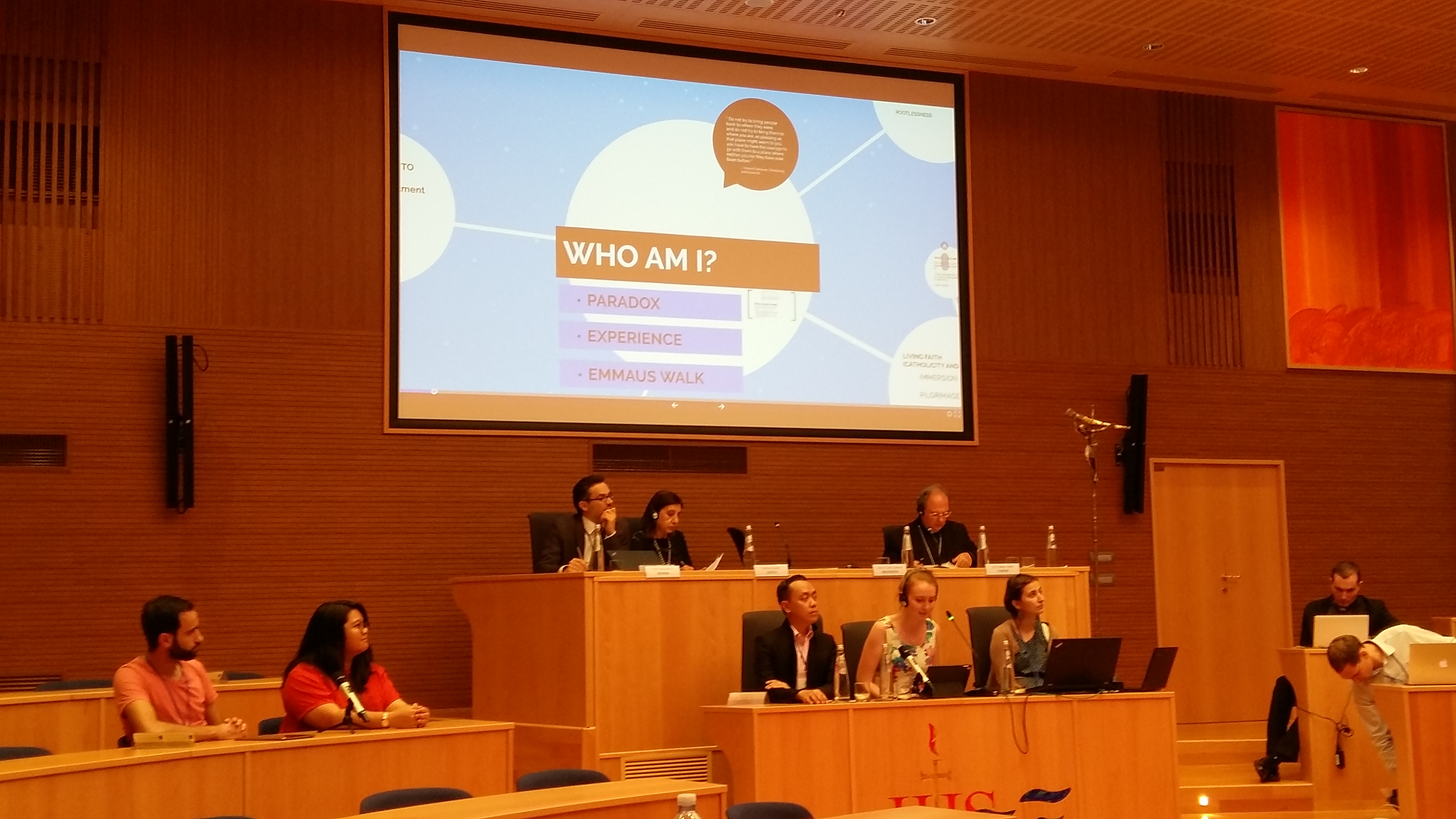 “The Biblical meditations at the start of each day led us to profound reflection. One that impressed us was the passage which brought to light that to reveal the life of Jesus to the young, one must have experienced it: how important is the testimony of life!” The various themes on young people in relation to identity, planning, otherness, technology, and transcendence proposed realistic scenarios not without their challenges but always open to hope. They talked about the importance of pastoral initiatives in which young people are the protagonists when accompanied by adults willing to live with them the search for the meaning of life. “Now we want to elaborate the experiences that we live with their educational and evangelizing value to offer to the Church.” “The seminar was a great opportunity for the Church to be open, to show what she is doing for the young; and for us to work with the Church, to change the realities of the world. The Church wants to listen to us, to know what we think, what we can do concretely, and it wants to face the difficulties with us. We did not find answers, but we proceed together,” Marina explains.
“The Biblical meditations at the start of each day led us to profound reflection. One that impressed us was the passage which brought to light that to reveal the life of Jesus to the young, one must have experienced it: how important is the testimony of life!” The various themes on young people in relation to identity, planning, otherness, technology, and transcendence proposed realistic scenarios not without their challenges but always open to hope. They talked about the importance of pastoral initiatives in which young people are the protagonists when accompanied by adults willing to live with them the search for the meaning of life. “Now we want to elaborate the experiences that we live with their educational and evangelizing value to offer to the Church.” “The seminar was a great opportunity for the Church to be open, to show what she is doing for the young; and for us to work with the Church, to change the realities of the world. The Church wants to listen to us, to know what we think, what we can do concretely, and it wants to face the difficulties with us. We did not find answers, but we proceed together,” Marina explains. 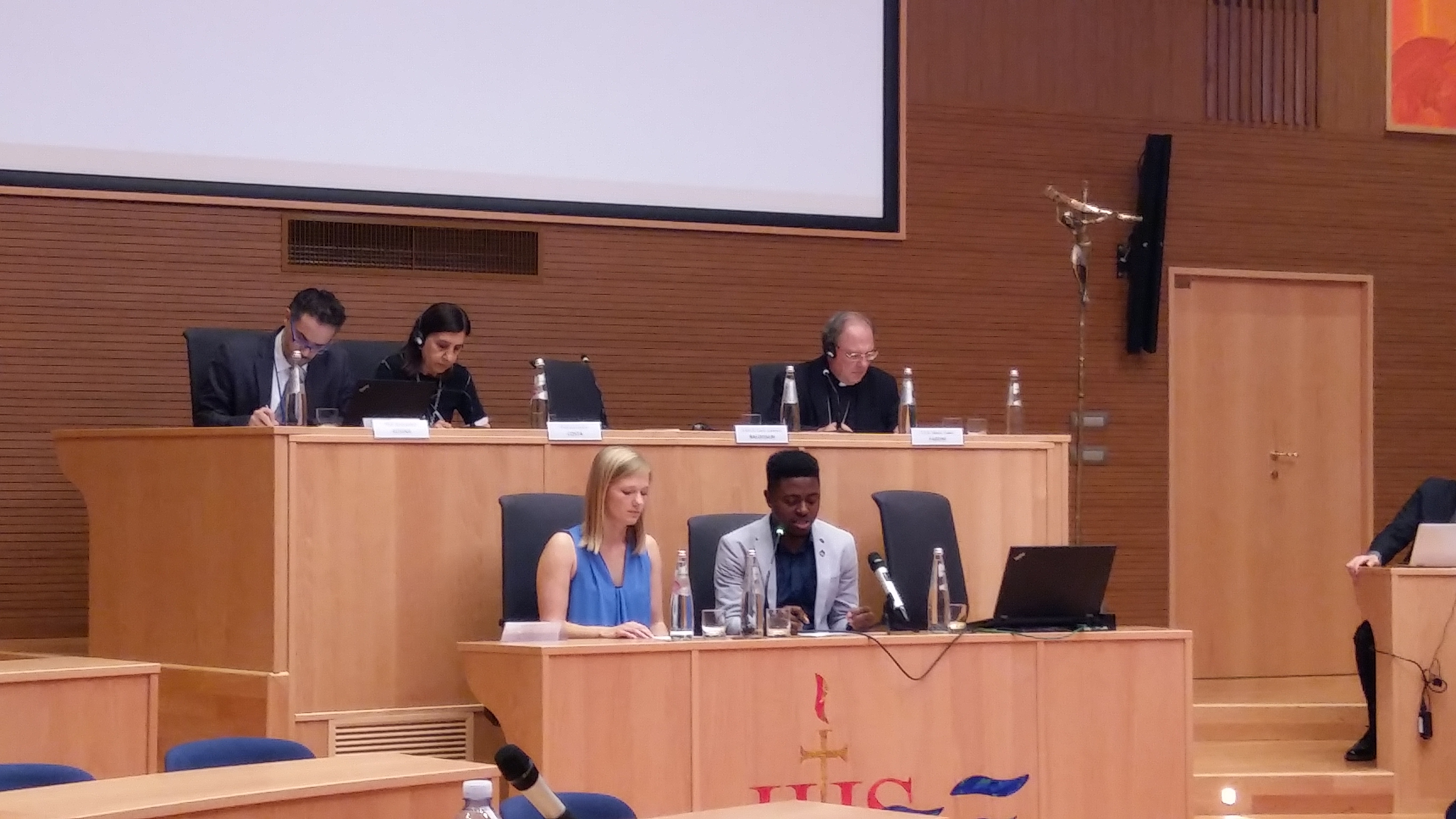 The conclusions highlight the need to build the change and become generators of life in listening to each other, young people and adults. “Concrete proposals have emerged that will be presented to the Synod Fathers. Among these, a team of young people alongside the work of the General Secretariat of the Synod to prepare opportunities for discussion and dialogue during the work of the Synod among bishops and young people and firmly engage some of them in the offices of the Holy See; a Church recognized by all as ‘home – communion – family.’ Of the days spent in Rome, we bring away so many pearls, such as in the preparatory document which speaks of young people: ‘The possibility of their blossoming depends on the capacity of our care, not by the desire to change the other but to grow together.’” “The Synod of Youth – concludes Cardinal Baldisseri, Secretary General of the Synod on Youth – can represent a part of that missionary renewal of the Church, which for the apostolic exhortation Evangelii gaudium, constitutes the challenge of this age. We must address young people not only to help us understand how to proclaim the Gospel but also to better understand what Jesus asks of His Church, what he expects from it, what to cut and what to sew again for this mission.” Another “part” will certainly be the Genfest 2018 to be held in Manila (Philippines) and also the World Youth Day (WYD) in January 2019 in Panama.
The conclusions highlight the need to build the change and become generators of life in listening to each other, young people and adults. “Concrete proposals have emerged that will be presented to the Synod Fathers. Among these, a team of young people alongside the work of the General Secretariat of the Synod to prepare opportunities for discussion and dialogue during the work of the Synod among bishops and young people and firmly engage some of them in the offices of the Holy See; a Church recognized by all as ‘home – communion – family.’ Of the days spent in Rome, we bring away so many pearls, such as in the preparatory document which speaks of young people: ‘The possibility of their blossoming depends on the capacity of our care, not by the desire to change the other but to grow together.’” “The Synod of Youth – concludes Cardinal Baldisseri, Secretary General of the Synod on Youth – can represent a part of that missionary renewal of the Church, which for the apostolic exhortation Evangelii gaudium, constitutes the challenge of this age. We must address young people not only to help us understand how to proclaim the Gospel but also to better understand what Jesus asks of His Church, what he expects from it, what to cut and what to sew again for this mission.” Another “part” will certainly be the Genfest 2018 to be held in Manila (Philippines) and also the World Youth Day (WYD) in January 2019 in Panama.
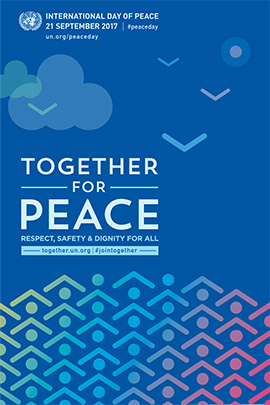
Sep 21, 2017 | Non categorizzato
 “Together for Peace: Respect, Safety and Dignity for All.” is the theme of International Day of Peace proclaimed by the United Nations each year on September 21. It aims to promote the respect, safety and dignity of all those who are forced to flee from their homes in search of a better life. Established in 1981 as the Day of Peace & Non-violence, its recurrence is an invitation to all Member States, to UN organizations, regional and non-governmental organizations, and people of good will, to implement education, training and public awareness on issues of peace, respect, support for diversity, acceptance of migrants and refugees, and to reject all forms of discrimination.
“Together for Peace: Respect, Safety and Dignity for All.” is the theme of International Day of Peace proclaimed by the United Nations each year on September 21. It aims to promote the respect, safety and dignity of all those who are forced to flee from their homes in search of a better life. Established in 1981 as the Day of Peace & Non-violence, its recurrence is an invitation to all Member States, to UN organizations, regional and non-governmental organizations, and people of good will, to implement education, training and public awareness on issues of peace, respect, support for diversity, acceptance of migrants and refugees, and to reject all forms of discrimination.
Sep 20, 2017 | Non categorizzato
Last night, only two weeks following the previous earthquake, the Aztec country was again hit by a powerful earthquake (7.1 on the Richter Scale). At present there are 217 casualties, 117 of which were in the capital, but this figure is unfortunately expected to rise. Twenty-six children and 4 adults lost their lives when a school collapsed in the South-Eastern part of Mexico City. Although 11 children have been rescued, about thirty children and some adults need to be lifted from the rubble. Many buildings are destroyed and at least 4 million people remain without electricity. 72 victims are recorded in the state of Morelos and 43 in Puebla, where the little town of the Focolare, “Mariápolis El Diamante”, is located. “We were at table when we felt the strong earthquake. So far no members of our Focolare community in Puebla have been effected by the earthquake. We are all fine,” they said. Many countries in the region and the world have offered solidarity. “In this moment of great suffering, I wish to show my solidarity with all the people of Mexico,” Pope Francis said in his heartfelt appeal during the General Audience.
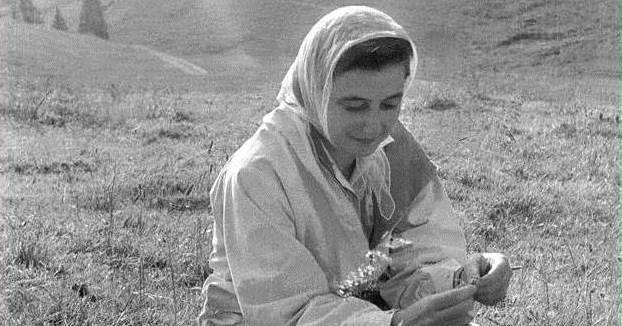
Sep 20, 2017 | Non categorizzato
 During a meeting in 2000, Chiara recalled her first “discovery” of Jesus Forsaken: “We understood something new about Him through an event that happened in January 1944. Through a particular circumstance, we came to realize that the greatest pain Jesus had suffered – and therefore the moment of His greatest love for us – was when He experienced the abandonment of the Father: ‘My God, my God, why have you forsaken me?’ (Mt 18:20). It touched us deeply. Being so young, so enthusiastic, but especially because of the grace of God, we felt urged to choose Him precisely in His abandonment, as the way to achieve our ideal of love. From that moment on we saw His face everywhere.” Another key moment in the understanding of this “mystery of suffering-love” was in the summer of 1949. Igino Giordani went to visit Chiara Lubich who had gone for a period of rest in the Valle di Primiero in the mountains of Trent, Italy. This small group of first followers that accompanied her was living with intensity the Gospel passage about the abandonment of Jesus. And those days in the mountains turned out to be days of such intense light that when it came time for them to leave their “little Tabor” and return to the city, Chiara quickly penned a text that has now become famous “I have only one spouse on earth, Jesus Forsaken. . . I will go through the world searching for him in every moment of my life.” Many years later she would explain: “Right from the start we knew that there was another side to it all, that the tree had its roots. The Gospel covers you in love, but it demands everything from you as well. ‘If the grain of wheat, which falls to the ground, does not die,’ we read in John, ‘it remains alone; but if it dies, it produces much fruit’ (cf Jn 12:24). This is personified in Jesus Forsaken, and the fruit that he bore was humankind’s Redemption. Jesus Forsaken! Who had experienced within himself the separation of humankind from God and from each other, and had experienced the Father far from him, was seen by us not only in all of our personal sufferings, which were never lacking, or in the sufferings of our neighbors who often were all alone, abandoned and forgotten, but also in all the divisions, the traumas, the splits, the mutual indifference whether large or small: within families, among generations, between rich and poor, at times in the Church itself; later, among the different Churches; and then, among religions and between believers and those who have no religious faith at all.” “But all of these lacerations,” Chiara continued, “never frightened us. Rather, for love of Jesus Forsaken, they attracted us. And he is the one who taught us how to confront them, how to live them, how to overcome them when, after the abandonment, he placed his spirit in the Father’s hands: ‘Father, into your hands I commend my spirit’ (Lk 23:46). And this is how he offered humankind the possibility of being recomposed within itself and with God, and he us showed how. He was the one who recomposed unity among us each time it was cracked. He became our only Spouse. And our life together with such a Spouse was so rich and fruitful that it pushed me to write a book, as a love letter, a song, a joyful thanksgiving song to Him.”
During a meeting in 2000, Chiara recalled her first “discovery” of Jesus Forsaken: “We understood something new about Him through an event that happened in January 1944. Through a particular circumstance, we came to realize that the greatest pain Jesus had suffered – and therefore the moment of His greatest love for us – was when He experienced the abandonment of the Father: ‘My God, my God, why have you forsaken me?’ (Mt 18:20). It touched us deeply. Being so young, so enthusiastic, but especially because of the grace of God, we felt urged to choose Him precisely in His abandonment, as the way to achieve our ideal of love. From that moment on we saw His face everywhere.” Another key moment in the understanding of this “mystery of suffering-love” was in the summer of 1949. Igino Giordani went to visit Chiara Lubich who had gone for a period of rest in the Valle di Primiero in the mountains of Trent, Italy. This small group of first followers that accompanied her was living with intensity the Gospel passage about the abandonment of Jesus. And those days in the mountains turned out to be days of such intense light that when it came time for them to leave their “little Tabor” and return to the city, Chiara quickly penned a text that has now become famous “I have only one spouse on earth, Jesus Forsaken. . . I will go through the world searching for him in every moment of my life.” Many years later she would explain: “Right from the start we knew that there was another side to it all, that the tree had its roots. The Gospel covers you in love, but it demands everything from you as well. ‘If the grain of wheat, which falls to the ground, does not die,’ we read in John, ‘it remains alone; but if it dies, it produces much fruit’ (cf Jn 12:24). This is personified in Jesus Forsaken, and the fruit that he bore was humankind’s Redemption. Jesus Forsaken! Who had experienced within himself the separation of humankind from God and from each other, and had experienced the Father far from him, was seen by us not only in all of our personal sufferings, which were never lacking, or in the sufferings of our neighbors who often were all alone, abandoned and forgotten, but also in all the divisions, the traumas, the splits, the mutual indifference whether large or small: within families, among generations, between rich and poor, at times in the Church itself; later, among the different Churches; and then, among religions and between believers and those who have no religious faith at all.” “But all of these lacerations,” Chiara continued, “never frightened us. Rather, for love of Jesus Forsaken, they attracted us. And he is the one who taught us how to confront them, how to live them, how to overcome them when, after the abandonment, he placed his spirit in the Father’s hands: ‘Father, into your hands I commend my spirit’ (Lk 23:46). And this is how he offered humankind the possibility of being recomposed within itself and with God, and he us showed how. He was the one who recomposed unity among us each time it was cracked. He became our only Spouse. And our life together with such a Spouse was so rich and fruitful that it pushed me to write a book, as a love letter, a song, a joyful thanksgiving song to Him.”

 “An experience of the living Church, on a journey, in dialogue, and going forth,” are the words of Paola Pepe e Jonathan Michelon (the people responsible for the International Gen Schools of Loppiano), summarizing the experience of the International Seminar on the situation of young people. This is part of a series organized by the General Secretariat of the Synod of Bishops in preparation for the XV Ordinary General Assembly on the theme, “Young People, the Faith, and Vocational Discernment.” “We had an experience of profound communion, ‘synod training’ in contact with various ecclesiastical institutions. Since the summer we have been preparing, along with other youth of the Focolare from different countries, in order to send our contribution to the General Secretariat of the Synod,” they wrote, together with Leandro (Argentina), Marina (Brazil) and Nelson (El Salvador). The program of the Seminar was rich in content for the authoritative work by education providers, economists, communications experts, sociologists, and youth chaperones, all passionate about working with young people. Out of 82 participants from 5 continents, there were 21 young people present, who gave their valuable contribution to the work being done, reflecting on the proposals of method and content for the upcoming synod. It was very significant that the organizing body readily welcomed and implemented some of their suggestions regarding the methodology of the unfolding of the program, with greater sharing in plenary.
“An experience of the living Church, on a journey, in dialogue, and going forth,” are the words of Paola Pepe e Jonathan Michelon (the people responsible for the International Gen Schools of Loppiano), summarizing the experience of the International Seminar on the situation of young people. This is part of a series organized by the General Secretariat of the Synod of Bishops in preparation for the XV Ordinary General Assembly on the theme, “Young People, the Faith, and Vocational Discernment.” “We had an experience of profound communion, ‘synod training’ in contact with various ecclesiastical institutions. Since the summer we have been preparing, along with other youth of the Focolare from different countries, in order to send our contribution to the General Secretariat of the Synod,” they wrote, together with Leandro (Argentina), Marina (Brazil) and Nelson (El Salvador). The program of the Seminar was rich in content for the authoritative work by education providers, economists, communications experts, sociologists, and youth chaperones, all passionate about working with young people. Out of 82 participants from 5 continents, there were 21 young people present, who gave their valuable contribution to the work being done, reflecting on the proposals of method and content for the upcoming synod. It was very significant that the organizing body readily welcomed and implemented some of their suggestions regarding the methodology of the unfolding of the program, with greater sharing in plenary. “The Biblical meditations at the start of each day led us to profound reflection. One that impressed us was the passage which brought to light that to reveal the life of Jesus to the young, one must have experienced it: how important is the testimony of life!” The various themes on young people in relation to identity, planning, otherness, technology, and transcendence proposed realistic scenarios not without their challenges but always open to hope. They talked about the importance of pastoral initiatives in which young people are the protagonists when accompanied by adults willing to live with them the search for the meaning of life. “Now we want to elaborate the experiences that we live with their educational and evangelizing value to offer to the Church.” “The seminar was a great opportunity for the Church to be open, to show what she is doing for the young; and for us to work with the Church, to change the realities of the world. The Church wants to listen to us, to know what we think, what we can do concretely, and it wants to face the difficulties with us. We did not find answers, but we proceed together,” Marina explains.
“The Biblical meditations at the start of each day led us to profound reflection. One that impressed us was the passage which brought to light that to reveal the life of Jesus to the young, one must have experienced it: how important is the testimony of life!” The various themes on young people in relation to identity, planning, otherness, technology, and transcendence proposed realistic scenarios not without their challenges but always open to hope. They talked about the importance of pastoral initiatives in which young people are the protagonists when accompanied by adults willing to live with them the search for the meaning of life. “Now we want to elaborate the experiences that we live with their educational and evangelizing value to offer to the Church.” “The seminar was a great opportunity for the Church to be open, to show what she is doing for the young; and for us to work with the Church, to change the realities of the world. The Church wants to listen to us, to know what we think, what we can do concretely, and it wants to face the difficulties with us. We did not find answers, but we proceed together,” Marina explains.  The conclusions highlight the need to build the change and become generators of life in listening to each other, young people and adults. “Concrete proposals have emerged that will be presented to the Synod Fathers. Among these, a team of young people alongside the work of the General Secretariat of the Synod to prepare opportunities for discussion and dialogue during the work of the Synod among bishops and young people and firmly engage some of them in the offices of the Holy See; a Church recognized by all as ‘home – communion – family.’ Of the days spent in Rome, we bring away so many pearls, such as in the preparatory document which speaks of young people: ‘The possibility of their blossoming depends on the capacity of our care, not by the desire to change the other but to grow together.’” “The Synod of Youth – concludes Cardinal Baldisseri, Secretary General of the Synod on Youth – can represent a part of that missionary renewal of the Church, which for the apostolic exhortation Evangelii gaudium, constitutes the challenge of this age. We must address young people not only to help us understand how to proclaim the Gospel but also to better understand what Jesus asks of His Church, what he expects from it, what to cut and what to sew again for this mission.” Another “part” will certainly be the Genfest 2018 to be held in Manila (Philippines) and also the World Youth Day (WYD) in January 2019 in Panama.
The conclusions highlight the need to build the change and become generators of life in listening to each other, young people and adults. “Concrete proposals have emerged that will be presented to the Synod Fathers. Among these, a team of young people alongside the work of the General Secretariat of the Synod to prepare opportunities for discussion and dialogue during the work of the Synod among bishops and young people and firmly engage some of them in the offices of the Holy See; a Church recognized by all as ‘home – communion – family.’ Of the days spent in Rome, we bring away so many pearls, such as in the preparatory document which speaks of young people: ‘The possibility of their blossoming depends on the capacity of our care, not by the desire to change the other but to grow together.’” “The Synod of Youth – concludes Cardinal Baldisseri, Secretary General of the Synod on Youth – can represent a part of that missionary renewal of the Church, which for the apostolic exhortation Evangelii gaudium, constitutes the challenge of this age. We must address young people not only to help us understand how to proclaim the Gospel but also to better understand what Jesus asks of His Church, what he expects from it, what to cut and what to sew again for this mission.” Another “part” will certainly be the Genfest 2018 to be held in Manila (Philippines) and also the World Youth Day (WYD) in January 2019 in Panama. 

